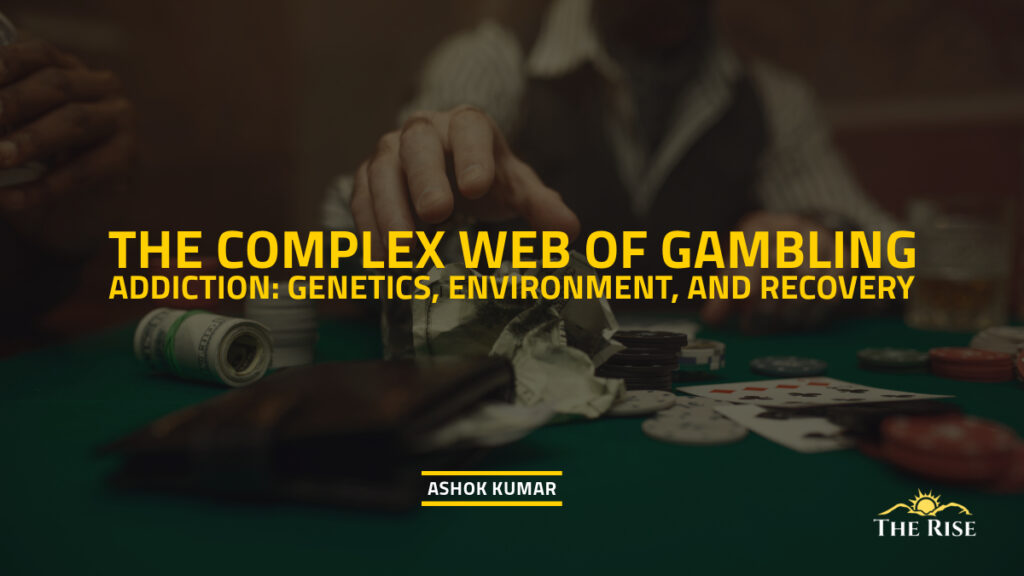Recovery from gambling addiction is a journey, and relapse is possible. However, seeking professional help and building a strong support network are essential steps toward a gambling-free life.
While there isn’t a single, definitive “gambling gene,” research indicates a genetic predisposition to gambling addiction. This article explores the genetic factors involved, the role of environmental influences, and the complex interaction between the two. Additionally, it outlines the signs of gambling addiction and effective treatment options.
Genetic Influence on Gambling Addiction
Studies have demonstrated a strong genetic component in compulsive gambling. Specific genes related to dopamine and serotonin—neurotransmitters linked to reward and mood regulation—are potential factors contributing to this predisposition. A family history of gambling problems is also a significant risk factor, indicating that genetics can play a substantial role in the likelihood of developing a gambling addiction.
The Role of Environmental Factors
Recognizing that genetics is just one piece of the puzzle is essential. Environmental factors, such as upbringing, social influences, and the availability of gambling opportunities, also play crucial roles in the development of gambling addiction. These factors can trigger or amplify genetic tendencies, making the environment a key component in understanding gambling behavior.
The Complex Interaction Between Genetics and the Environment
The relationship between genetics and gambling addiction is complex. A genetic predisposition might increase susceptibility, but it does not guarantee addiction. Environmental factors can serve as catalysts, leading to the onset of gambling problems in individuals who are genetically predisposed. Therefore, understanding the interplay between genetic and environmental factors is crucial for prevention, treatment, and support.
Recognizing the Signs of Gambling Addiction
Identifying the signs of gambling addiction can be crucial in seeking help. Below are some common behavioral and emotional indicators:
Behavioral Signs:
- Obsession with gambling: Constant thoughts about gambling, planning the next gambling session.
- Increasing bets: Needing to wager larger amounts to achieve the same thrill.
- Unsuccessful attempts to quit: Repeatedly trying to control, cut back, or stop gambling without success.
- Restlessness or irritability: Feeling agitated when trying to reduce gambling.
- Gambling as an escape: Using gambling to avoid problems and cope with negative emotions.
- Chasing losses: Betting more to recoup previous losses.
- Lying about gambling: Hiding the extent of gambling activities from loved ones.
- Neglecting responsibilities: Prioritizing gambling over work, school, or family commitments.
- Financial problems: Experiencing financial difficulties due to gambling.
- Stealing or illegal activities: Resorting to theft or criminal acts to fund gambling.
Emotional Signs:
- Mood swings: Experiencing rapid mood changes, often related to gambling outcomes.
- Depression: Feeling depressed or hopeless due to gambling losses.
- Anxiety: Experiencing excessive worry or stress related to gambling.
- Guilt or shame: Feeling remorse or embarrassment about gambling behavior.
If you or someone you know is exhibiting these signs, it is important to seek professional help. There are effective treatments available to overcome gambling addiction.
Treatment Options for Gambling Addiction
Treatment for gambling addiction is effective and can help individuals regain control of their lives. Here are the primary approaches:
Therapy:
- Cognitive-behavioral therapy (CBT): Helps identify and change negative thought patterns related to gambling.
- Behavioral therapy: Focuses on developing coping mechanisms and avoiding gambling triggers.
- Group therapy: Sharing experiences with others in recovery can provide support and encouragement.
- Family therapy: Involving family members can help improve communication and support the individual in recovery.
Medications:
While there are no medications specifically approved for gambling addiction, some medications can help manage co-occurring conditions like depression or anxiety.
Self-Help Groups:
Gamblers Anonymous (GA): A 12-step program similar to Alcoholics Anonymous, offering peer support and guidance.
Support Systems:
Strong support from family, friends, and a supportive community is crucial for recovery.
Conclusion: The Path to Recovery
Recovery from gambling addiction is a journey, and relapse is possible. However, seeking professional help and building a strong support network are essential steps toward a gambling-free life. Understanding the complex interplay of genetic and environmental factors can aid in prevention, treatment, and ongoing support.
The relationship between genetics and gambling addiction is complex. A genetic predisposition might increase susceptibility, but it doesn’t guarantee addiction. Environmental factors can trigger or amplify genetic tendencies.
In conclusion, while genetics can influence the likelihood of developing a gambling problem, it’s not the sole determinant. Understanding the interplay between genetic and environmental factors is crucial for prevention, treatment, and support.
Signs of Gambling Addiction:
Recognizing the signs of gambling addiction can be crucial in seeking help. Here are some common indicators:
Behavioral Signs
Obsession with gambling: Constant thoughts about gambling, planning the next gambling session. Increasing bets: Needing to wager larger amounts to achieve the same thrill. Unsuccessful attempts to quit: Repeatedly trying to control, cut back, or stop gambling without success. Restlessness or irritability: Feeling agitated when trying to reduce gambling. Gambling as an escape: Using gambling to avoid problems, and cope with negative emotions. Chasing losses: Betting more to recoup previous losses. Lying about gambling: Hiding the extent of gambling activities from loved ones. Neglecting responsibilities: Prioritizing gambling over work, school, or family commitments. Financial problems: Experiencing financial difficulties due to gambling. Stealing or illegal activities: Resorting to theft or criminal acts to fund gambling.
Emotional Signs
Mood swings: Experiencing rapid mood changes, often related to gambling outcomes. Depression: Feeling depressed or hopeless due to gambling losses.Anxiety: Experiencing excessive worry or stress related to gambling. Guilt or shame: Feeling remorse or embarrassment about gambling behavior.
If you or someone you know is exhibiting these signs, it’s important to seek professional help. There are effective treatments available to overcome gambling addiction.
Treatment for Gambling Addiction
Treatment for gambling addiction is effective and can help individuals regain control of their lives. Here are the primary approaches:
Therapy
Cognitive-behavioral therapy (CBT): This helps identify and change negative thought patterns related to gambling.
Behavioral therapy: This focuses on developing coping mechanisms and avoiding gambling triggers.
Group therapy: Sharing experiences with others in recovery can provide support and encouragement.
Family therapy: Involving family members can help improve communication and support the individual in recovery.
Medications
While there are no medications specifically approved for gambling addiction, some medications can help manage co-occurring conditions like depression or anxiety.
Self-Help Groups
Gamblers Anonymous (GA): This is a 12-step program similar to Alcoholics Anonymous, offering peer support and guidance.
Support Systems
Strong support from family, friends, and a supportive community is crucial for recovery.
Remember: Recovery is a journey, and relapse is possible. Seeking professional help and building a strong support network are essential steps toward a gambling-free life.
Disclaimer: The views expressed in this article are of the author solely. TheRise.co.in neither endorses nor is responsible for them. Reproducing this content without permission is prohibited.
About the author
Prof. Ashok Kumar is former Vice-Chancellor of Deen Dayal Upadhyaya University, Gorakhpur (U.P.) & CSJM University, Kanpur, (U.P.), Nirwan University, Jaipur, Rajasthan, and Shri Kallaji Vedic University, Nimbahera, Rajasthan. He is President of the Social Research Foundation, International Society of Life Sciences.





























What an insightful and informative article.
Thanks